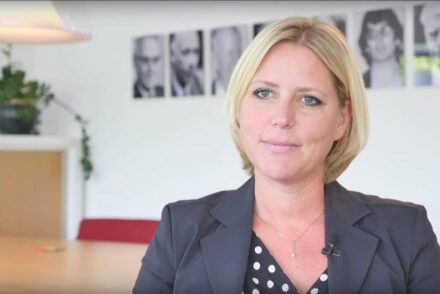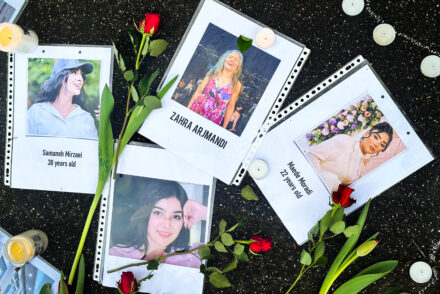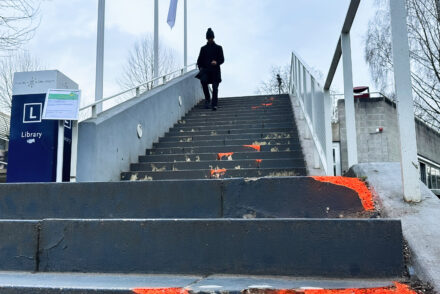Healthcare innovation and portable power supply winning ideas at Tilburg University Challenge
The life-saving ‘Emergency PowerBox’ and the sustainable healthcare startup Saga Medi are the big winners of the Tilburg University Challenge 2025. ‘I now have contacts I can actually make use of.’
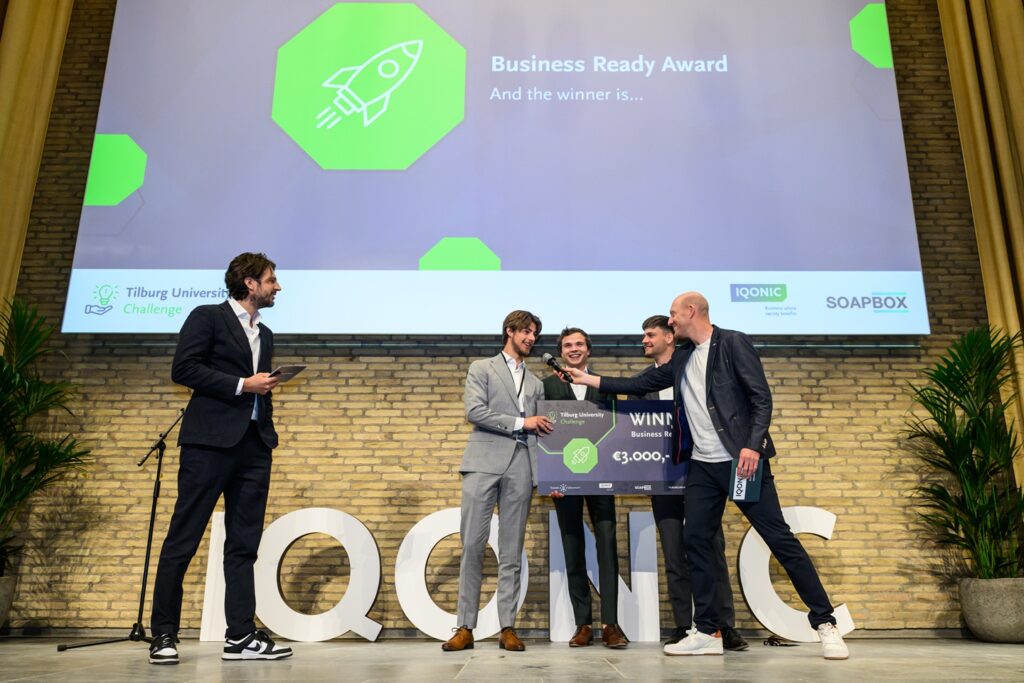
From a smart pillbox to green rooftops. And from an app to help beat screen addiction to a discount card for young cancer patients. During the final of the Tilburg University Challenge on Thursday, May 22, eight student teams presented their innovative ideas.
The challenge is designed to encourage students to embrace entrepreneurship. Over a period of four months, sixty teams developed their ideas into full-fledged business plans. They received workshops, coaching, and opportunities to expand their network. After a selection process, eight finalists remained, divided into two categories: Ideation (concept phase) and Business Ready (market-ready plans).
During the final, each team has two minutes to convince the jury and the audience.
The kick-off
The final begins in the auditorium with a compilation video of a networking day at football club Willem II, where students earlier pitched their plans to companies. ‘I hope that some of these ideas will eventually make it to bigger competitions like the EY Challenge,’ says host Renze Klamer.
Rector Magnificus Wim van de Donk emphasizes the importance of entrepreneurship to the audience: ‘This university stands for entrepreneurial thinking.’ According to Van de Donk, this is becoming increasingly important. ‘As society changes, for instance when jobs are replaced by AI, we need to create new jobs and continue to innovate.’
Then it’s time for the finalists. As the tension in the room becomes palpable, the pitches follow one another in rapid succession. Behind many of the plans lies more than just a good idea—personal stories give the innovations extra weight.
Personal stories
The creators of the Emergency PowerBox, for example, came up with their device after the earthquake in Turkey. In the chaos following the disaster, they were unable to reach their friends. Their portable power supply is designed to save lives in such situations. ‘We can’t save our friends anymore, but maybe we can save someone else’s life,’ says Cagan Kilinc, a student of Cognitive Science and Artificial Intelligence.
Tijmen Meuleman, founder of LumiCane and a student of Entrepreneurship and Business Innovation, developed his light-up cane for the blind out of concern for his father, who is blind and often feels unsafe on the street at night. With the bright, highly visible light, he wants to make the world safer for his father and others.
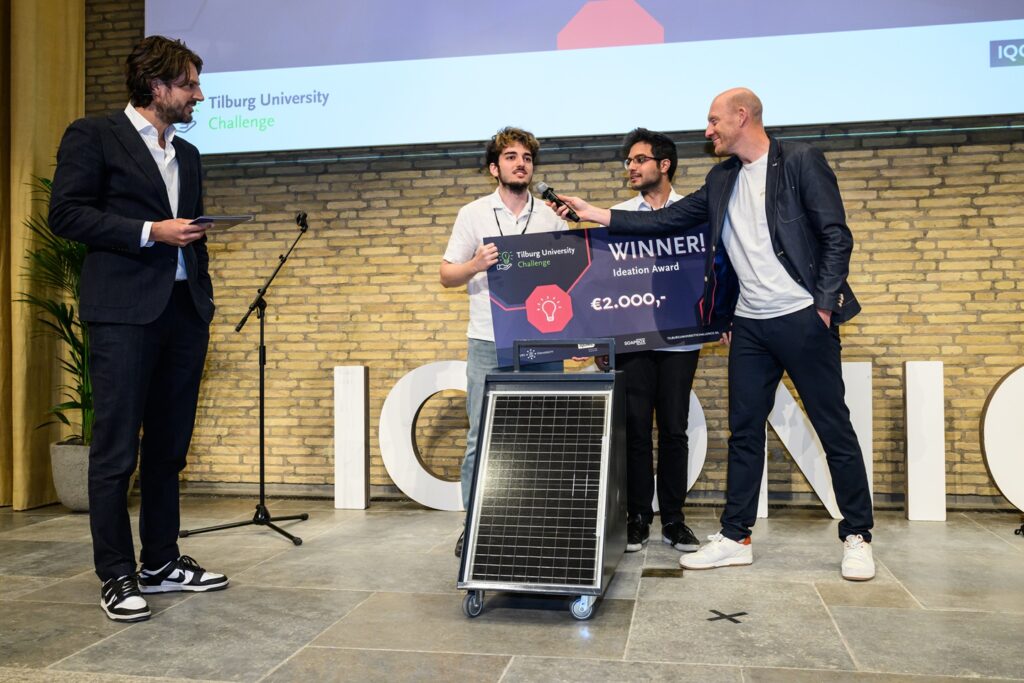
The Emergency PowerBox is a portable power supply for emergency situations. Image: Jack Tummers
Other ideas also stem from personal experiences. The founders of Vibe, an app against screen addiction, admit they themselves spend too much time on their phones. With their app, they want to help users break their digital habits. The discount card for young cancer patients was devised by a student who had cancer himself and realized how little money he had left for enjoyable activities.
After each pitch, a brief and sharp Q&A follows. The expert jury wants to know how feasible the plans are, what the revenue model looks like, and whether a prototype already exists. Some teams are rigorously challenged. The outcome is still wide open.
Emergencies
The jury reaches a decision: in the Ideation category, the Emergency PowerBox takes the win. The jury praises the relevance and necessity of the portable power supply for emergency situations, especially because the device can also set up a radio network, making people independent of cell towers or internet.
Students Cagan Kilinc and Kerem Peker built the prototype themselves—a large portable device that generates electricity using solar energy. ‘We already have five or six years of experience in programming and electronics, so we had the skills to build it ourselves,’ Peker explains. The students win €2,000 for their venture.
Healthcare startup
The grand prize in the Business Ready category goes to Saga Medi, a healthcare startup focused on sustainable innovations in hospitals, such as a reusable and fully circular alternative to the disposable kidney dish used to collect things like blood and vomit. The jury is unanimous: Saga Medi wins the Tilburg University Challenge 2025. The students are already far along with their startup and can definitely use the prize money.
‘We recently started large-scale production; we’ve already paid half, and the other half still needs to be paid,’ says Richard Puureveen, a master’s student in Strategic Management and Entrepreneurship. The students behind Saga Medi win €3,000, plus another €500 as co-winner of the audience award.
The other audience award winner, developer Tijmen Meuleman of the light-up cane for the blind, looks back on the Tilburg University Challenge. ‘The support from the university is excellent. I now have contacts I can make use of throughout the entire process,’ he says. He plans to spend the €500 on marketing.
The beginning
Afterwards, the crowd moves to the drinks reception. The tension gradually fades, students breathe a sigh of relief, and toasts are made. Jury members offer compliments, entrepreneurs approach finalists, and networking is in full swing. Although the competition is over, for many participants their entrepreneurial journey seems to be just beginning. The ideas are there. Now for the next step.




